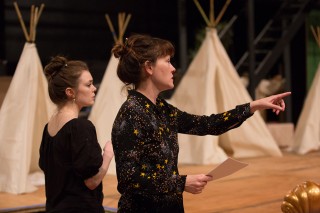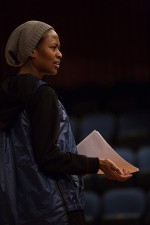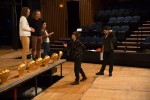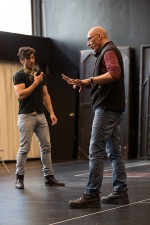Title

Erica Schmidt is directing Love’s Labour’s Lost. She's pictured here with Victoria Pollack.
(Photo by Rosalie O'Connor)The magic of Shakespeare is casting its spell on the third-year actors as they prepare for their annual repertory cycle, which runs from May 3 through 11. Directors Erica Schmidt (Love’s Labour’s Lost) and Jonathan Rosenberg (A Midsummer Night’s Dream) sat down with dramaturge Shana Komitee to talk about the productions.
The third-year Shakespeare repertory production of A Midsummer Night’s Dream features Medina Senghore.
(Photo by Rosalie O'Connor)Director Erica Schmidt provides notes to Matt Helm, Golden Garnick, Isabel Arraiza, and John Bambery, who are appearing in the third-year Drama production of Love's Labour's Lost.
(Photo by Rosalie O'Connor)Body
Why did you want to direct your respective plays?
Schmidt: I’ve wanted to direct Love’s Labour’s Lost for a while—I think it works really well with young people. It’s about youth, the mistaken placement of values, what happens in romance and courtship, and falling in love with the idea of love. And then what happens when reality [abruptly] comes in at the end.
Rosenberg: I’ve always avoided Midsummer. The grooves are so deep, it’s almost like you can say the lines along with the actors. It’s funny to hear Erica talk because I’m interested in a kind of mirror image of what she describes. For me, the world of Athens [in A Midsummer Night’s Dream] is what happens when people are repressed by society. When they get to the woods outside Athens, that’s when the repression is taken away and a kind of cruel, manipulative id is released, which is kind of the flip side of what Erica said. What I don’t like about some productions of Midsummer is a kind of alliance between the actors and the audience against the characters. The characters are made fun of. I don’t want to do that. I want to take them seriously, at face value. We’re not going to look for the jokes, to make the play-within-the-play hammy and shtick.
Schmidt: That’s all I’m going to do: Look for the jokes [laughs]. But seriously, Jonathan, for all of the darkness you describe, you end up with weddings, and we end up with death!
Rosenberg: Yeah, but marriages are weird in Shakespeare. There’s no happy marriages. The comedies always end in weddings, but you don’t know what’s going to happen afterward.
Many directors stage Shakespeare in alternative or radical settings. Some theaters, like Oregon Shakespeare Company, even “translate” words in his plays to make them more understandable to audiences. What do you make of the controversy surrounding this debate?
Rosenberg: I’ve directed in Berlin and all they do [is stage Shakespeare plays in contemporary vein]. How they approach the classics is not a difference in degree [from America]; it’s a fundamentally different conversation. It’s not merely about alternative settings but a different relationship altogether to the theatrical text. A theater academic in Germany explained to me that because of the horrors of the 20th century, there are two things Germans don’t trust: language and emotions. So what might be considered really shocking here is just what they do there. Everything is, how does this engage with this present moment, with this present audience. That has changed the way I’ve thought about Shakespeare.
Schmidt: To me the body of Shakespeare is the language. I think that’s why this controversy is so intense. Because why rewrite his plays? It’s not like the plots are so wonderful. The language is the thing that makes it universal and lasting.
In 2014 This American Life’s Ira Glass tweeted “Shakespeare is unrelatable.” It kicked off a firestorm, and he walked back his comment the next day. So Erica, when you say Shakespeare is the language—what about audience members who don’t have the schooling, familiarity, or time to delve into all of Shakespeare? They may not understand or relate to the plays.
Schmidt: I don’t think you need any of that. I think Shakespeare was writing for the audience pit. We just don’t care about words anymore. Culturally, we’re just behind.
What about an audience member who comes and can’t follow—
Schmidt: Well, when it says in Love’s Labour’s Lost “and with his royal finger, thus daily with my excrement,” I think we get that. And that’s funny. And pretty clear.
Rosenberg: I disagree with Ira Glass. Not because I have some religious devotion to the text. I think it’s a mistake to separate the plays from the productions of them. And I think that when you see very good, well-investigated productions, Shakespeare’s totally clear. When you see bad productions, you stand up and blame the language. That is fundamentally wrong.
Schmidt: I agree.
Tell me about your setting choices.
Schmidt: I wanted to create a world that was very, very beautiful. All you need is a tree, [because Berowne] is supposed to be up a tree. To add or change anything is to overcomplicate. I take that to heart. I was interested in almost an ABC Carpet world of really curated beauty: a tree that’s covered in paper lanterns and twinkle lights, and is pretty, expensive, and artificial. I wanted to make it romantic and fun, and hopefully very funny. Then Marcade enters, in all black—the set will be off-white—so he stands out clearly. The women know he’s [bad] news because of the way he’s dressed, and they respond very practically. They know things have been very fun—like spring break or a holiday—but they always knew it had to end. I want the audience to be wooed by it all, to want to live in the fantasy. It feels very collegiate, but then comes the rude awakening.
Rosenberg: My setting is hard to synthesize. There are reference points, but the way they manifest in the actual production is not direct or literal. I had this image very early on of all of Athens taking place on one narrow carpet that’s rolled out; then, when Athens is done, it gets rolled back. A friend sent me a YouTube video of blasted-out Gaza after the [summer 2014] war with Israel with a half-mile- long red carpet that was rolled out over the devastation so that a dignitary would have his own little [pristine] thing to walk on. In our production, a red carpet gets rolled out for the scenes in Athens.
Schmidt: That sounds awesome. But I’m kind of a purist with Shakespeare. I like to lean on the rhymes; that’s how I start. All I know is there’s a tree. It wouldn’t occur to me to think about Gaza. And working with the design team, it was complicated to allow a space for nothing. To not design the stage, to leave it spare. We’ll never think that we’re outside—but we’ll understand that we’re outside.
Rosenberg: I think what’s so great about your set— which is totally my aesthetic—is it’s clearly a theatrical construction. It has natural elements, but you’re clearly inside a theater.
What do you hope the students will get out of doing two shows in repertory?
Rosenberg: It’s fantastic for them. Because they can’t get too precious—they have to work hard and be able to switch on a dime.
Schmidt: With Shakespeare, the more you do it, the easier it is. Also, the more plays you’re exposed to, the easier it is. It will be invaluable for them to go back and forth, especially between these two plays that have so many similarities. The thing you learn in one place will only help you in the other place if you’re just facile and apply it. That’s really exciting.
Can you say more about which themes overlap?
Rosenberg: These are two plays that are to some degree associated as sort of the same genre, but in many ways, Erica and I have opposite feelings about them. [Her] world will be so incredibly beautiful, exquisite, and spare—and mine is gritty, busy, and ugly. So I think it will be great for an audience member to see both of them at once—and have two completely different experiences at the theater. Taken together, they will provide a satisfying—and complicated—experience for the people watching them.







